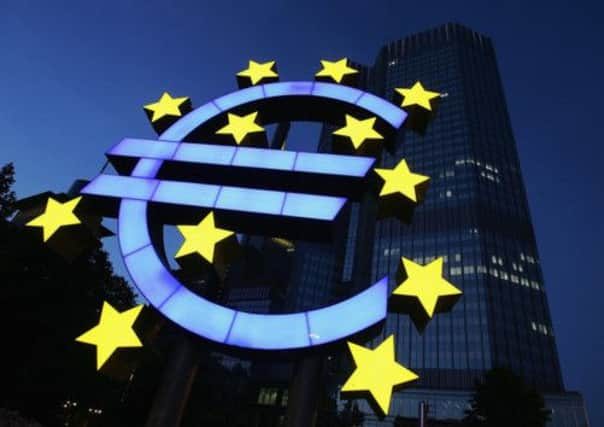EU boss says Europe’s economy at a turning point


The commission, the European Union’s executive arm, said rising business confidence and strengthening domestic demand are expected to underpin the recovery as governments also slow the pace of austerity measures such as spending cuts and tax increases.
“There are increasing signs that the European economy has reached a turning point,” said the EU commissioner for economic and monetary affairs Olli Rehn. But that recovery will be at a subdued pace that will leave unemployment near record highs, he warned.
Advertisement
Hide AdAdvertisement
Hide AdMr Rehn said the EU’s economy is expected to grow 0.5 per cent over the second half of the year – leaving it flat for the whole year – and expand 1.4 per cent in 2014. The commission’s last predictions, issued in May, had expected a drop of 0.1 per cent in 2013. The 17-country eurozone is forecast to continue its recovery from recession, from which it emerged in the second quarter.
However, over 2013 as a whole, the eurozone is still expected to record a decline of 0.4 per cent. For next year, the commission is now predicting 1.1 per cent growth.
Mr Rehn said governments’ deficit reductions and reforms “have created the basis for recovery”. But the forecasts show that will do little to alleviate the plight of the jobless.
Unemployment in the eurozone is expected to remain at its record high of 12.2 per cent this and next year, dropping to 11.8 per cent in 2015.
Scottish Labour MEP David Martin said austerity programmes across Europe were to blame for the lack of progress in tackling unemployment. Mr Martin added: “We have had four or five years of little investment, which has not been enough to feed the recovery.
“At the same time we have austerity policies, which mean that the worst of the public sector job cuts are yet to come. So economies have been squeezed from both sides and it is no surprise that we have a little bit of growth and not much in terms of employment.”
SNP MEP Alyn Smith said: “Today’s numbers show it is clear the European economies are still a long way from a clean bill of health, and more worrying still is that even this peely-wally growth seems to be increasingly jobless. They also make clear that we in these islands are in no way immune from the ‘eurozone crisis’ and have a lot to do.
“It is all the more important that government in all places do all they can to accelerate real growth exactly as the Scottish government has been doing – making payments fast, prioritising youth guarantees and pushing through infrastructure projects.”
Bad budget reporting
Advertisement
Hide AdAdvertisement
Hide AdThe European Union’s auditor said yesterday that bad budget reporting has increased further, resulting in several billions of euros in irregular spending of EU funds by the 27 member states and the executive commission.
Each member of the EU contributes about 1 per cent of its gross domestic product to the EU budget, which is then invested across Europe on various projects to bolster the economy. The European Court of Auditors (ECA) said that about 4.8 per cent of the EU’s €129 billion (£108bn) 2012 budget was wrongly approved for projects. That is up from 3.9 per cent the previous year and 3.7 per cent in 2010.
ECA president Vitor Caldeira called on EU authorities to make sure irregular spending is cut down in the future and more is done to recover such funds.